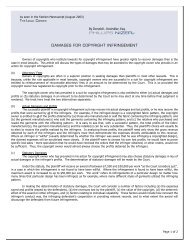International Charitable Giving And Planning ... - Phillips Nizer LLP
International Charitable Giving And Planning ... - Phillips Nizer LLP
International Charitable Giving And Planning ... - Phillips Nizer LLP
Create successful ePaper yourself
Turn your PDF publications into a flip-book with our unique Google optimized e-Paper software.
to charitable organizations only applies to organizations that are exclusively devoted tocharitable purposes. As mentioned above, in PLR 7837067 the IRS approved the grantof the estate tax charitable deduction to a charitable remainder trust established abroadprovided that the trust would be valid under local law.Nonresident Alien Withholding Tax for Foreign CRTSince a domestic CRT is exempt from tax except to the extent of unrelated businesstaxable income ("UBTI"), one might conclude that a foreign CRT with no UBTI should notbe subject to the nonresident alien withholding tax on fixed, periodic and determinableincome from U.S. sources. However, a CRT does not qualify as an exempt entity underRegs. §1.1441-1(b)(4)(xvii) because it is not exempt from tax under §501(c) but ratherunder §664(c). Under Regs. §1.1441-1(c)(6)(ii)(D), a CRT would be effectively treated asthe beneficial owner of the U.S. source income paid to it, and therefore the payments to itwould be subject to withholding tax, because a foreign trust that is neither a foreignsimple trust nor a foreign grantor trust is considered to be the beneficial owner of thetrust's income. Of course, if the trust's income consists solely of foreign income andincome eligible for exemptions from U.S. taxation under the relevant provisions of§871(a) (e.g., short-term original issue discount, bank account income, certain portfoliodebt, as well as capital gains on the sale of U.S. assets), there should be no nonresidentalien withholding on the CRT's U.S. source income. Since the foreign CRT would betreated as the beneficial owner of the U.S. source income paid to it, the CRT should haveno obligation to withhold U.S. income tax on payments made to a foreign annuitant.<strong>Charitable</strong> Lead TrustsA less popular, but in certain circumstances significant, tax-planning entity for U.S.persons with charitable intent is the charitable lead trust. The article addresses below theissue of whether a charitable lead trust may have a foreign charitable beneficiary, and theconsequences of establishing a charitable lead trust as a foreign trust.Foreign Charities Appear to Be Eligible Beneficiaries of CLTsUnlike CRTs, CLTs do not enjoy any automatic tax exemption. However, incomepermitted or required to be paid to a charitable beneficiary is eligible for the income taxcharitable deduction under §642(c). As noted above, in the case of the income taxcharitable deduction for non-charitable trusts, the restriction to U.S. charitable entitiesimposed on individual donors does not apply. It should be noted, however, that if anindividual donor is seeking an income tax deduction for a contribution to a charitable leadtrust, the charitable beneficiary must be a U.S. charity. There is no such limitation on theestate and gift tax charitable deductions and there does not appear to be any regulatoryequivalent to Regs. §20.2055-2(e)(2)(v) and §25.2522(c)-3(c)(2)(v), which, as discussedabove, appear to preclude the availability of the deduction in the case of testamentaryCRTs with foreign charitable remainder beneficiaries.A CLT May Be a Foreign TrustSince there is no per se limitation on the domestic or foreign status of a charitablebeneficiary of a CLT, it appears a CLT could be a foreign trust. If the charitable ornoncharitable beneficiary is a U.S. person, however, the trust will be a grantor trust under§679 and the grantor will taxable on all of the trust's income and gains. Of course, agrantor can claim a charitable income tax deduction on transfers to a charitable lead trustif the trust is a grantor trust and the charitable beneficiary is domestic. But the cost ofassuming any CLT's tax liability appears to be worth the benefit of the income taxcharitable deduction, at least under current law, only under certain limited circumstances,generally when the grantor is expecting to have significantly less income after the year inTax Management Estates Gifts and Trusts Journal © 2005 Tax Management Inc.® Pg. 15




